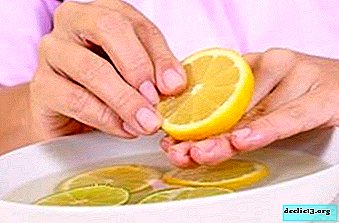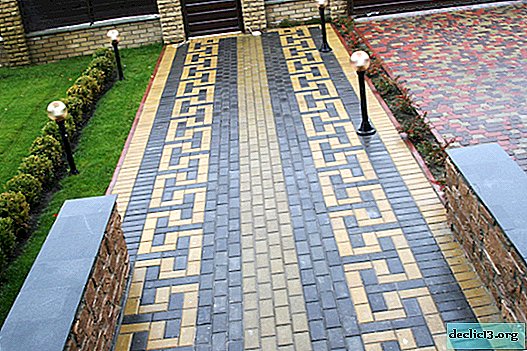How to apply lemon to strengthen nails at home?

Since ancient times, people made various healing products based on lemon. It is not surprising, because its composition is full of nutrients, only vitamin C is worth it.
Lemon juice strengthens the hair, it is used to lighten the skin, and the peel is needed to maintain immunity and save from the common cold.
We will examine in detail the benefits of lemon for restoring and strengthening nails at home.
Benefit
Lemon fruit - a storehouse of nutrients. From almost all of its parts, you can make a useful substance. So, lemon-based oils:
- have a strengthening and brightening property;
- disinfect the skin;
- freshen and disinfect.
Chemical composition
 Consider what is contained in lemon and in what proportions. Primarily, lemon is rich in vitamins of various groups. In addition to C, which everyone knows about, there are others:
Consider what is contained in lemon and in what proportions. Primarily, lemon is rich in vitamins of various groups. In addition to C, which everyone knows about, there are others:
- Vitamins of the PP group, A.
- B vitamins - 0.04 mg.
- Vitamins of group A - 0.02 mg.
- Vitamin A (RE) - 2 mcg.
- Beta-carotene - 0.01 mg.
- Vitamin C - 40 mg.
- Vitamin E - 0.2 mg.
- Vitamin PP - 0.2 mg.
Other beneficial substances:
- Calcium 40 mg.
- Magnesium 12 mg.
- Iron 0.6 mg.
- Zinc 0.1 mg.
- Copper 240 mcg.
- Manganese 0.04 mg.
- Fluoride 10 mcg.
- Molybdenum 1 mcg.
- Boron 175 mcg.
Indications
It is prescribed for vitamin deficiency, when the nails become weakened, brittle, acquire a yellowish tint. It is also recommended as a prophylaxis for strengthening the nail plates, maintaining them in an aesthetically attractive form, for nail growth and their shine.
Can it do harm?
But, despite the obvious usefulness of lemon, you need to use it wisely. Firstly, there are a number of contraindications, according to which the use of even a small amount of the same lemon juice is unacceptable.
Contraindications
For example, if you have a clear allergy to citrus fruits, it is best to avoid any foods that contain lemon extract. Usually an allergic reaction to lemon is redness and severe itching. But some people may have more serious symptoms - for example, suffocation and blisters on the skin. Restrictions and precautions also need to be careful.
Limitations
- It is better not to use lemon juice on the skin with a wound or cut, as the burning sensation will be unbearable.
- You can not combine lemon with other citrus fruits, otherwise you can provoke various reactions in your skin.
- Accurate lemon juice should be used by pregnant and lactating mothers.
How to use?
For nail care, there are various ways to use lemon. It can be a juice-based mask, it can be a care bath.
It is important that the lemon juice is in the correct proportions, mixed with the right ingredients and a strictly defined amount of time is applied.Consider popular and effective recipes.
Whitening mask
 You will need:
You will need:
- Lemon juice - 100 ml.
- Kaolin - 2 teaspoons.
- Warm water - 200 ml.
Application:
- Mix in the indicated proportions, apply on the nail plates with a thick layer, wait 20-30 minutes, you can wrap it with cling film.
- Then rinse thoroughly with water, apply a moisturizer.
Mask for whitening recipe 2:
- Mix any nutritious cream with two teaspoons of lemon and lemon essential oil, add milk whey (200 ml) or kefir.
- Apply with a thick layer on hands, put on special gloves or cling film and wrap in a warm towel.
- Keep about 15-20 minutes.
- Then rinse with warm water, use twice a week.
Nourishing mask
- Mix essential oils in equal proportions: lemon, chamomile, rose.
- Add avocado, olive and sunflower oil.
- Apply to nails, wrap fingers in foil, hold for 20 minutes.
- Then rinse with warm water, apply a nourishing cream.
Recipes
- Take 200 grams of oatmeal, soak in warm water, then drain the water, add lemon juice - three teaspoons, as well as a teaspoon of sea salt.
- Immerse your hands in the bath, hold for 15-20 minutes.
- Then rinse your hands.
- Apply twice a week for a month.
The second recipe for strengthening:
- Take a bath of warm soapy water, add a tablespoon of sea salt, lemon juice (two teaspoons), tea tree essential oils, thyme or castor oil.
- Immerse your hands in the bath, hold for 15-20 minutes.
- Then rinse your hands, apply a nourishing cream.
Honey Lemon Compress

- To use the compress, you need a bandage with a cotton wool or a thick piece of cotton fabric.
- Then take two tablespoons of any natural honey, mix with lemon juice and essential oils (preferably based on herbs of rosemary, chamomile or thyme).
- Mix the mixture with a small amount of hot (not scorching) water, and then put on a compress.
- Place on hands, hold until mixture has cooled.
- Wash off residues with water, compress once a week.
Tray with iodine and glycerin
- Collect warm soapy water in the bath, drip three drops of iodine, add five drops of glycerin and three teaspoons of lemon juice.
- Lower your hands in the bath and hold for 10-15 minutes.
- It is better not to rinse the mixture, but rub it into the nails, wait for it to dry.
By the way, myself iodine can be applied in small quantities on nails at nightif you feel that they have become too brittle.
How to apply essential oil?
Lemon essential oil can be added to any nail care product. It is advisable not to overdo it, drip a few drops into the bath or a portion of the cream. Essential oil is more concentrated and may be contraindicated for everyone who has an allergic reaction to citrus fruits.
Lemon - a great tool that not only cares for your nails, but also strengthens the platehelps get rid of yellow plaque. Plus - the use of lemon essential oils helps to restore strength, is an excellent aromatherapy and the prevention of colds.

















